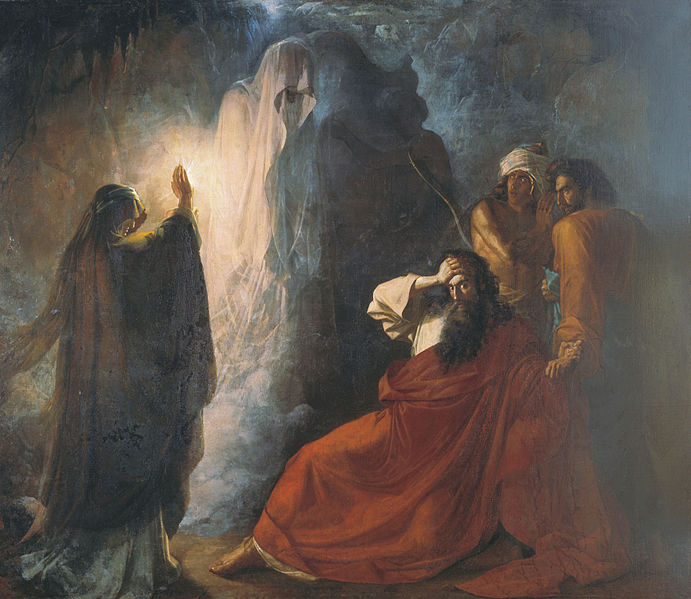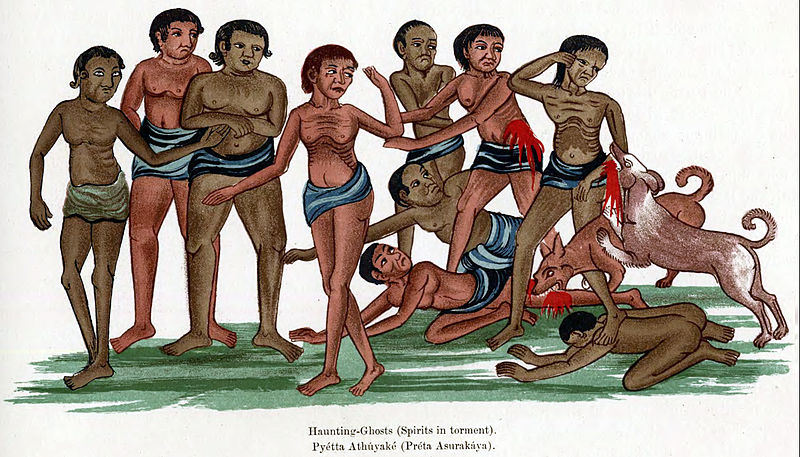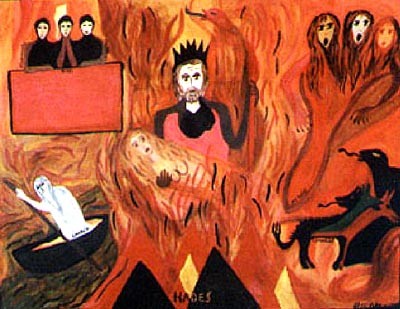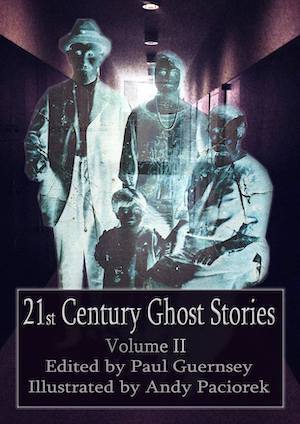by Editor
on September 9, 2014

The Shade of Samuel Invoked by Saul. Painting by D. Martynov (1826-1889)
The Bible Contains Surprisingly Few Ghost Stories
One particularly impressive aspect of humankind’s obsession with ghosts is that for over two millennia it has persisted and even flourished in Western literature and other forms of culture in spite of the fact that ghosts play no significant role in any of the Western Hemisphere’s three great religions: Judaism, Islam, or Christianity. Islam, for its part, teaches that there are no ghosts—ghostlike occurrences being attributed to other sorts of demonlike supernatural beings called jinns—while Christian teachings leave no room for the possibility of earthbound spirits: The souls of the dead go either to Heaven or Hell, or—in the case of the Catholic religion—possibly to Purgatory. (While officials of the Catholic Church do perform exorcisms to free people from supernatural affliction, these rituals are always meant to cast out demons—which never were human—rather than the disembodied spirits of the dead.)
As for the Jewish religion, ghosts are all but ignored in that great and ancient work of literature known as the Old Testament. The one notable Old Testament ghost reference occurs in Samuel 28:7-20 when King Saul, feeling himself abandoned by God, disguises himself as a beggar and visits the Witch of Endor. He asks the witch to summon the spirit of the prophet Samuel, from whom he desires a prediction concerning the outcome of his upcoming battle against the Philistines. (The Odyssey probably predates the writing and compilation of the Old Testament, and it is interesting to note that King Saul’s desire to speak with the spirit of Samuel is so similar to Odysseus’ need to speak with the dead soothsayer, Teiresias.) [continue reading…]
by Editor
on September 7, 2014
Ghosts In A Haunted Hotel: The Shining Twins
Not only is the classic 1980 film, The Shining, one of the greatest psychological thrillers of all time, but some critics consider it to be one of the best films in any genre. And it’s all about ghosts—ghosts who mess with the already messed-up psyche of alcoholic American writer Jack Torrance, played by Jack Nicholson in one of his finest performances.
The Shining begins with Jack taking a job as the winter caretaker at the old, haunted Overlook Hotel in the Colorado Rocky Mountains. He is accompanied by his wife and young son, Danny, and he intends to get some writing work done during his term of isolation at the remote lodge. [continue reading…]
by Editor
on September 7, 2014

A Burmese Depiction Of Hungry Ghosts In Torment
The Asian Tradition Of The Hungry Ghost
In Asian folklore and among many Buddhists, the hungry ghost is described as a spirit who is him- or herself haunted by needs, desires, and longings that went unfulfilled during the ghost’s earthly existence. These sad and frustrated wraiths are doomed to wander the earth in a (usually fruitless) search for the satisfactions that eluded them while they were alive.
In addition to perpetually wandering hungry ghosts, some Chinese people and people of Chinese descent who live in other Asian countries believe that the dead invisibly return from the afterlife to move among the living at certain times of the year. During hungry ghost festivals, which often occur in late summer, people set out food for their returning ancestors as well as for other disembodied visitors who happen by. [continue reading…]
by Editor
on September 6, 2014

Hades by Elsa Dax.
When Did People Start Writing Ghost Stories?
We know that stories about ghosts are as old as language itself. Stone age peoples in most parts of the world must have traded tales and warnings about the disembodied spirits of the dead. It was only natural that after writing developed some of humankind’s earliest literature began to include some ghostly material.
Some of the first Western literature reveals a preoccupation with doing right by the dead in order to prevent their ghosts from haunting the living. Homer’s epic poem, the Illiad, written nearly 3,000 years ago, contains the following passage (23.63 in Richmod Lattimore’s translation) in which a sleeping Achilles is berated by the ghost of his slain friend, Patroclus, for failing to properly tend to his corpse, thereby preventing him from entering the Land of the Dead (Lattimore: 23.99):
There appeared to him [Achilles] the ghost (psykhe) of unhappy Patroklos all in his likeness for stature, and lovely eyes, and voice, and wore such clothing as Patroklos had worn on his body. The ghost came and stood over his head and spoke a word to him: “You sleep, Akhilleus; you have forgotten me; but you were not careless of me when I lived, but only in death. Bury me as quickly as may be, let me pass through the gates of [Hades] (pylai Aidao). The souls (psykhai), the images (eidôla) of dead men, hold me at a distance, and will not let me cross the river and mingle among them, but I wander as I am by [Hades’] house of the wide gates (eurypyles Aidos dôma). And I call upon you in sorrow, give me your hand; no longer shall I come back from death, once you give me my rite of burning.” [continue reading…]




